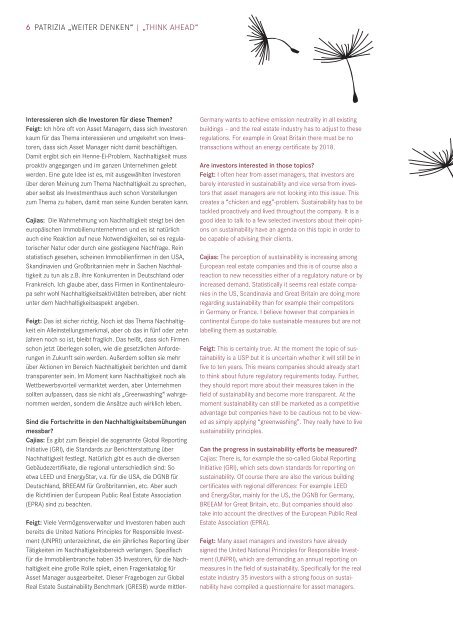„WEITER DENKEN“ | „THINK AHEAD“ - Contrast Capital
„WEITER DENKEN“ | „THINK AHEAD“ - Contrast Capital
„WEITER DENKEN“ | „THINK AHEAD“ - Contrast Capital
Erfolgreiche ePaper selbst erstellen
Machen Sie aus Ihren PDF Publikationen ein blätterbares Flipbook mit unserer einzigartigen Google optimierten e-Paper Software.
6 PATRIZIA <strong>„WEITER</strong> <strong>DENKEN“</strong> | <strong>„THINK</strong> <strong>AHEAD“</strong>Interessieren sich die Investoren für diese Themen?Feigt: Ich höre oft von Asset Managern, dass sich Investorenkaum für das Thema interessieren und umgekehrt von Investoren,dass sich Asset Manager nicht damit beschäftigen.Damit ergibt sich ein Henne-Ei-Problem. Nachhaltigkeit mussproaktiv angegangen und im ganzen Unternehmen gelebtwerden. Eine gute Idee ist es, mit ausgewählten Investorenüber deren Meinung zum Thema Nachhaltigkeit zu sprechen,aber selbst als Investmenthaus auch schon Vorstellungenzum Thema zu haben, damit man seine Kunden beraten kann.Cajias: Die Wahrnehmung von Nachhaltigkeit steigt bei deneuropäischen Immobilienunternehmen und es ist natürlichauch eine Reaktion auf neue Notwendigkeiten, sei es regulatorischerNatur oder durch eine gestiegene Nachfrage. Reinstatistisch gesehen, scheinen Immobilienfirmen in den USA,Skandinavien und Großbritannien mehr in Sachen Nachhaltigkeitzu tun als z.B. ihre Konkurrenten in Deutschland oderFrankreich. Ich glaube aber, dass Firmen in Kontinentaleuropasehr wohl Nachhaltigkeitsaktivitäten betreiben, aber nichtunter dem Nachhaltigkeitsaspekt angeben.Feigt: Das ist sicher richtig. Noch ist das Thema Nachhaltigkeitein Alleinstellungsmerkmal, aber ob das in fünf oder zehnJahren noch so ist, bleibt fraglich. Das heißt, dass sich Firmenschon jetzt überlegen sollen, wie die gesetzlichen Anforderungenin Zukunft sein werden. Außerdem sollten sie mehrüber Aktionen im Bereich Nachhaltigkeit berichten und damittransparenter sein. Im Moment kann Nachhaltigkeit noch alsWettbewerbsvorteil vermarktet werden, aber Unternehmensollten aufpassen, dass sie nicht als „Greenwashing“ wahrgenommenwerden, sondern die Ansätze auch wirklich leben.Sind die Fortschritte in den Nachhaltigkeitsbemühungenmessbar?Cajias: Es gibt zum Beispiel die sogenannte Global ReportingInitiative (GRI), die Standards zur Berichterstattung überNachhaltigkeit festlegt. Natürlich gibt es auch die diversenGebäudezertifikate, die regional unterschiedlich sind: Soetwa LEED und EnergyStar, v.a. für die USA, die DGNB fürDeutschland, BREEAM für Großbritannien, etc. Aber auchdie Richtlinien der European Public Real Estate Association(EPRA) sind zu beachten.Feigt: Viele Vermögensverwalter und Investoren haben auchbereits die United Nations Principles for Responsible Investment(UNPRI) unterzeichnet, die ein jährliches Reporting überTätigkeiten im Nachhaltigkeitsbereich verlangen. Spezifischfür die Immobilienbranche haben 35 Investoren, für die Nachhaltigkeiteine große Rolle spielt, einen Fragenkatalog fürAsset Manager ausgearbeitet. Dieser Fragebogen zur GlobalReal Estate Sustainability Benchmark (GRESB) wurde mittler-Germany wants to achieve emission neutrality in all existingbuildings – and the real estate industry has to adjust to theseregulations. For example in Great Britain there must be notransactions without an energy certificate by 2018.Are investors interested in those topics?Feigt: I often hear from asset managers, that investors arebarely interested in sustainability and vice versa from investorsthat asset managers are not looking into this issue. Thiscreates a “chicken and egg”-problem. Sustainability has to betackled proactively and lived throughout the company. It is agood idea to talk to a few selected investors about their opinionson sustainability have an agenda on this topic in order tobe capable of advising their clients.Cajias: The perception of sustainability is increasing amongEuropean real estate companies and this is of course also areaction to new necessities either of a regulatory nature or byincreased demand. Statistically it seems real estate companiesin the US, Scandinavia and Great Britain are doing moreregarding sustainability than for example their competitorsin Germany or France. I believe however that companies incontinental Europe do take sustainable measures but are notlabelling them as sustainable.Feigt: This is certainly true. At the moment the topic of sustainabilityis a USP but it is uncertain whether it will still be infive to ten years. This means companies should already startto think about future regulatory requirements today. Further,they should report more about their measures taken in thefield of sustainability and become more transparent. At themoment sustainability can still be marketed as a competitiveadvantage but companies have to be cautious not to be viewedas simply applying “greenwashing”. They really have to livesustainability principles.Can the progress in sustainability efforts be measured?Cajias: There is, for example the so-called Global ReportingInitiative (GRI), which sets down standards for reporting onsustainability. Of course there are also the various buildingcertificates with regional differences: For example LEEDand EnergyStar, mainly for the US, the DGNB for Germany,BREEAM for Great Britain, etc. But companies should alsotake into account the directives of the European Public RealEstate Association (EPRA).Feigt: Many asset managers and investors have alreadysigned the United National Principles for Responsible Investment(UNPRI), which are demanding an annual reporting onmeasures in the field of sustainability. Specifically for the realestate industry 35 investors with a strong focus on sustainabilityhave compiled a questionnaire for asset managers.


